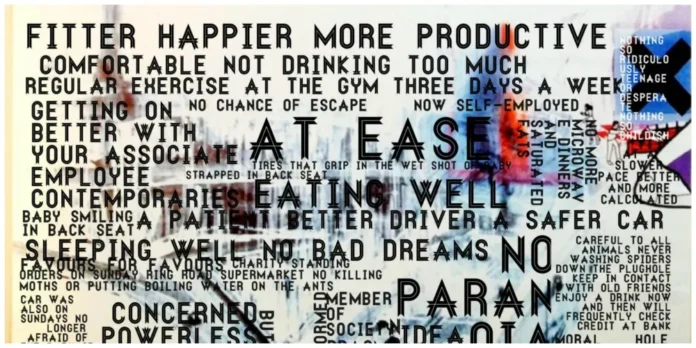
Radiohead’s “Fitter Happier” offers an opportunity to reflect on unrealistic expectations of progress:
“Fitter Happier,” the album’s most anomalous track and most difficult listen, incorporates a computer text generated voice to paint a picture of an ideal society in the future. Dissonant and jarring piano chords have an unpleasant effect on the listener and accompany the computerized narrating voice, which lists in rapid succession unreasonable expectations for both personal and societal progress. Such expectations of the narrator include “Sleeping well, no bad dreams, no paranoia / No longer afraid of the dark or midday shadows / Nothing so ridiculously teenage and desperate.”
The seemingly positive lyrics are instantly stripped of their deceptive facade as the song’s ominous and discomforting sound takes a more looming presence. The clashing piano, strings, and electronic instruments all convey an atmosphere of despair and false hope through irregular time signatures and asymmetric sections. The hidden overarching theme present in “Fitter Happier” is a society driven by consumerism and advertisements. Much of the song portrays an ideal lifestyle—a society preoccupied with “eating well,” “not drinking too much,” and “a safer car”—while being oblivious to the fact that there is “no chance of escape” from the rituals and routines they have been accustomed to. (Hong, 2017, paras. 9, 10)
How many people can live their lives this way? What happens when you try to live your life by those dictums? Indeed, who is asking you to? What self-help guru’s religion should you follow to become a fitter, happier, more productive version of yourself? (Maheshwari, 2018, para. 5)
The song is, first and foremost, a commentary on modern society’s obsession with conformity and keeping up appearances, and how draining such upkeep can be. However, “Fitter Happier” also speaks to dualities—for example, the dangers of suppressing human emotion and interaction, but how artificial such relationships can be. “Regular exercise at the gym, three days a week / Getting on better with your associate employee contemporaries / At ease,” the song says at one point. “No longer afraid of the dark or midday shadows / Nothing so ridiculously teenage and desperate / Nothing so childish / At a better pace, slower and more calculated.”
As “Fitter Happier” progresses, cracks in the well-adjusted façade start to appear (“Now self-employed / Concerned, but powerless”) before becoming full-blown yawning chasms by the song’s end (“No longer empty and frantic / Like a cat / Tied to a stick / That’s driven into / Frozen winter s—“). It’s emblematic of how madness can subtly creep in and infect the soul, as well as external relationships.
Today, the song’s alienation still feels entirely relevant. If anything, it’s more relevant today, in an age where social media fosters both connection and detachment—and dystopian vibes feel stronger every day. (Zaleski, 2017, paras. 1, 2, 9)
I gathered a few articles that I thought best encapsulated the song’s meaning, and I found it reflected what a financial planner would spit out as the expectations for personal progress. As people, we can see this rapid succession as unreasonable, but to a computer, it creates an ideal society. How many people truly want to live this way, and can an algorithm accurately accommodate those who don’t? When applied to banking, will an algorithm be able to initiate self-growth or should it rely on the customer to set it in motion?
One article mentions social media as a driving force behind connection and detachment; I think this could be broadened to emerging technology as a whole. This concept calls attention to a society driven by consumerism, slowly creeping into false hope. How can this be turned around? What is there to incentivize people, if not more stuff and promised progress?
In what ways can technology perform as a tool for positive change instead of adding to the disconnection? How would a system use artificial interactions to balance the need for authentic relationships?
References
Hong, W. (2017). Fitter, Happier, More Innovative… The Legacy of Radiohead’s “OK Computer.” The Spectator. https://stuyspec.com/article/fitter-happier-more-innovative-the-legacy-of-radiohead-s-ok-computer
Maheshwari, P. (2018, March 4). Fitter, Happier, More Productive. Medium. https://medium.com/@pranshum/fitter-happier-more-productive-f04fb04e9c05
Zaleski, A. (2017, May 15). Writer’s Block and Unsettled Thoughts Inform Radiohead’s ‘Fitter Happier.’ Townsquare Media. https://diffuser.fm/radiohead-fitter-happier/



